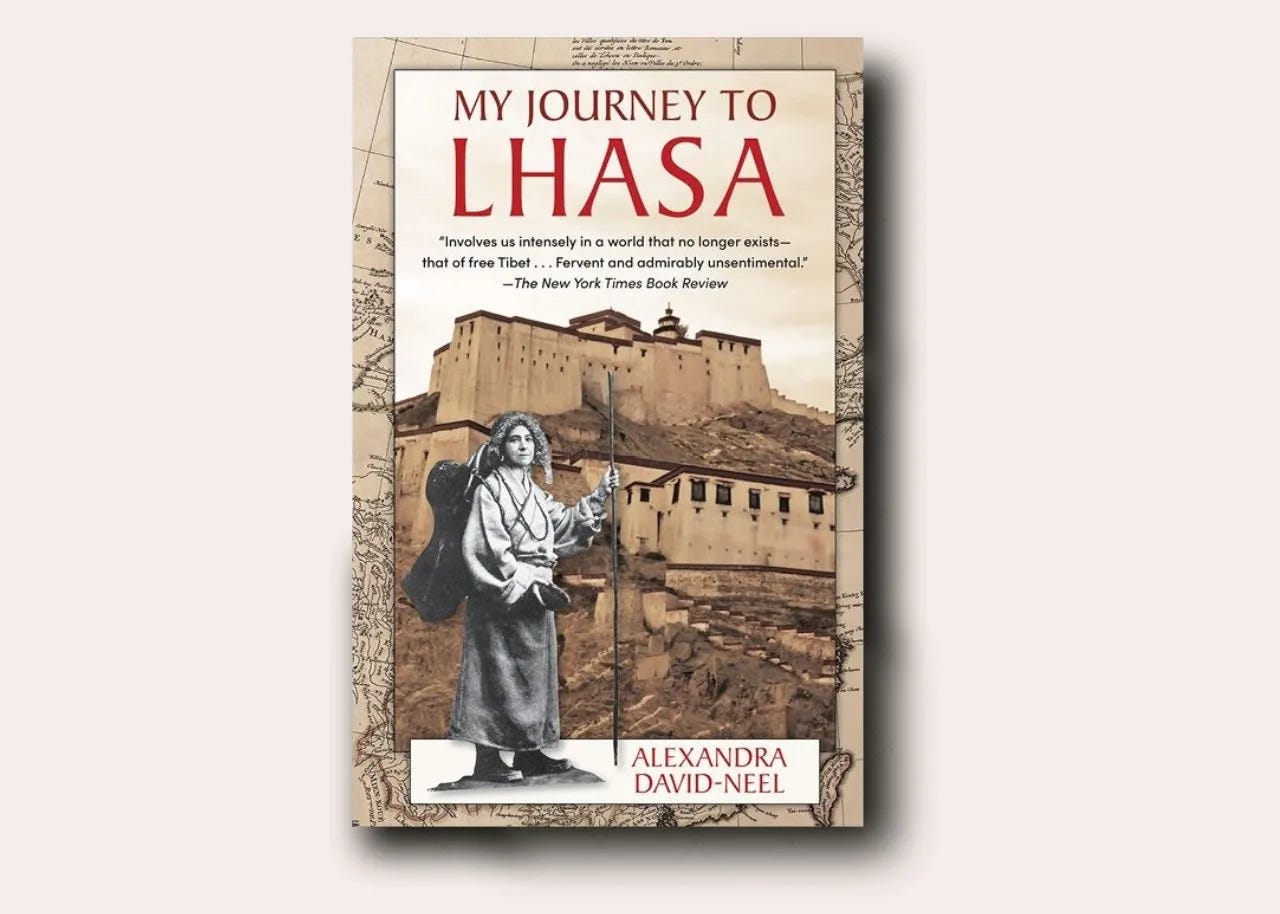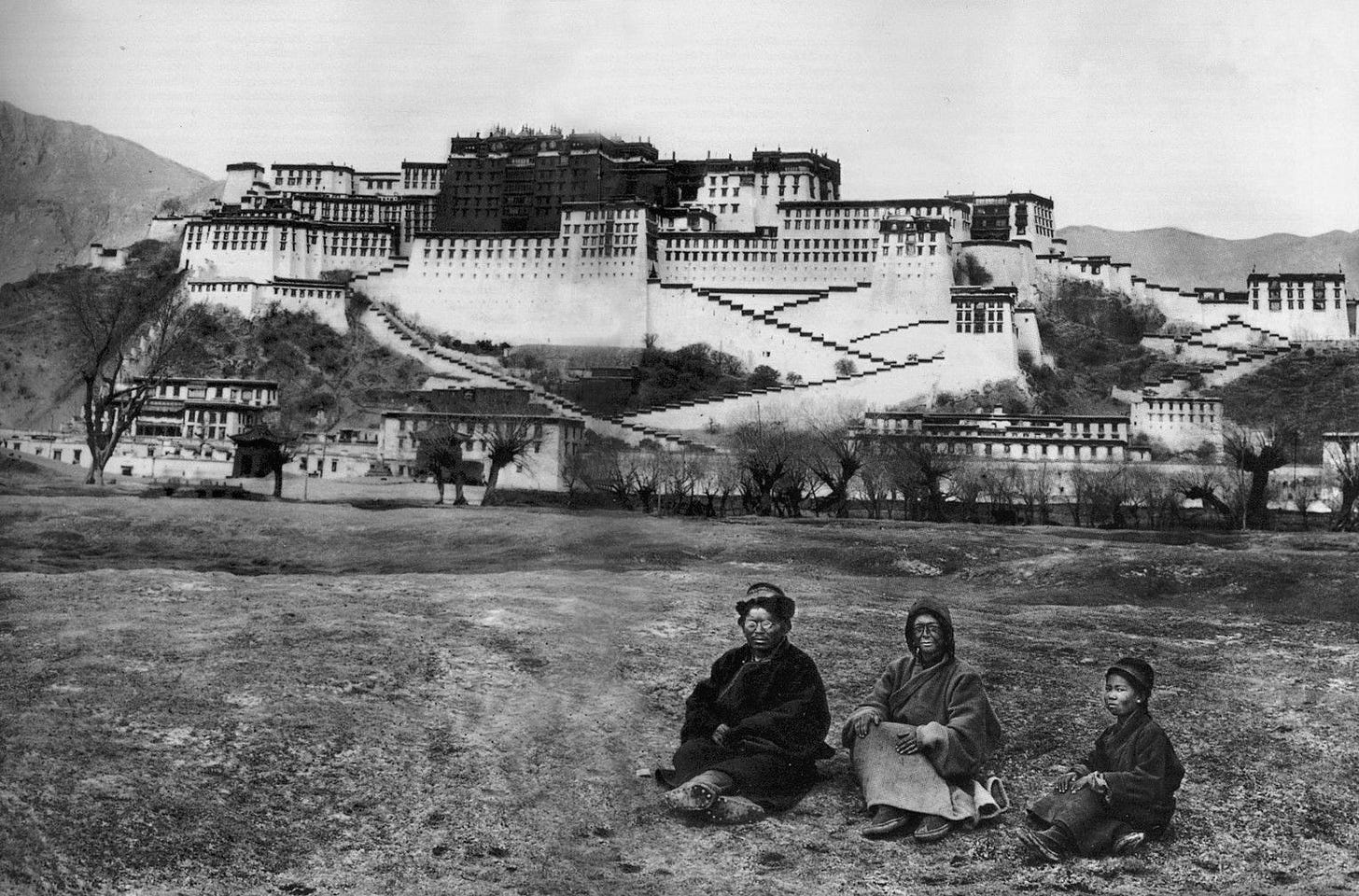A Parisian's journey to Lhasa: How travel can change your life
Distilling books - Number 2
Welcome to Mental Garden. The following letter is part of our “Distilling Books” collection, in which we extract the most revealing ideas from literature. For the complete library, click here.
🏷️ Categories: Literature, Learning, Social relationships, Decision making and biases.
People have never travelled so much, but most do so as passive observers.
They see a lot, but experience little.
Think about how most people approach travel. They just follow Google recommendations, visit the most famous places without understanding much about what those places mean, take perfect photos to show off on Instagram, eat at the best-rated restaurants on the internet and return home.
They come back with memories... but has anything changed in them?
In the end, it's a bit sad. That amazing experience becomes a kind of passive observation, similar to watching a movie, but a hell of a lot more expensive.
What if it didn't have to be like that, what if travel was a transformative experience?
The difference between a tourist and a traveller is not the destination, is the mindset.
A transformative journey: The woman who went from Paris to Lhasa
‘I set out secretly at dawn, driving my little caravan through the vast Tibetan solitudes. Barren deserts and silent meadows, both wild and enigmatic, fascinating and high rough lands, horizons of dreams and mysteries...’
‘I had the good idea to choose the beginning of the year to stay in Lhasa; it would have been difficult for me, at another time, to attend so many strange festivals and interesting ceremonies. Mingling with the crowds, dressed in their finery, I saw cavalcades of cavalrymen sumptuously attired in the old Mongolian fashion, infantry and cavalry from the army of the ancient kings, in chain mail, carrying spears and shields, evoking the Tibet of old. There were brief horse races, messy, wild, joyous, fun, of course, but no match for those of the grassy desert shepherds. Each day brought a new spectacle: religious or profane.’
— Alexandra David-Néel, My Journey to Lhasa.
When it comes to how a journey can transform us, this story is brutal.
In the early 20th century, the explorer and writer Alexandra David-Néel set out on a journey through Asia, driven by her insatiable curiosity. With what she had saved she set off and promised her husband that she would return in a year and a half. She was an enthusiast for Eastern philosophy and was not content to sit and read in Europe.
She wanted to see for herself and travelled to Lhasa, the capital of Tibet.
She travelled through China and India on a journey that would transform her life forever. She visited the most remote corners of the Himalayas, studied in Tibetan monasteries, made a spiritual retreat as a hermit and meditated in caves at an altitude of over 4000 metres, met the 13th Dalai Lama and even disguised herself as a beggar to enter the city of Lhasa, a city forbidden to foreigners at the time.
The journey was not a geographical move, it was a personal transformation.
She captured her experiences in Journey to Lhasa, an account of her journey and inner evolution.
Through her encounters with monks, hermits and villagers, Alexandra learned about human diversity, spirituality, the customs of remote corners and the freedom that detachment from material things brings. It was an immersion in a new way of understanding life, of relating, of living together.
And the most important thing is that she recorded everything she learned and how it transformed her.
In these passages she talks about how she integrated and quickly learned the customs:
‘A good woman brought us into her house to feed us. The meal consisted of curdled milk and tsampa (roasted barley flour). The custom requires that first the milk and then the tsampa be poured into the wooden bowl which every Tibetan always carries with him, and the mixture is then made with the fingers.’
‘It would have been contrary to Tibetan custom to go through the place without stopping to eat, as the time had come for the tsaphog (the stop which interrupts the midday to rest)...’
‘The East - especially in Tibet - is the land of mystery and strange events. If one knows how to look, listen and observe with continued attention, one discovers a world beyond the one we are accustomed to consider as the only real one, perhaps because we do not analyse the phenomena that compose it as much as we should, nor trace sufficiently the chain of causes that determine them’.
Here are 4 key ideas from Alexandra for an enriching trip.
1. Connect
Travelling is not just about seeing places, it's about immersing yourself in them, like Alexandra.
Talk to the locals, practice their customs, learn about their lifestyle and ways of relating. This counteracts your confirmation bias, frees you from prejudices and opens you up to a real experience. Don't just be a passive spectator who follows set routes and takes pictures; seek out the essence of the place and its people.
To strengthen this connection, a useful tool is to keep a travel diary.
You don't need to write long pages, but you can write down your thoughts and conversations to keep a record of what you have experienced.
Here are some moments of connection with the locals that Alexandra recorded:
‘People with agricultural implements were on their way to work, others were already busy distributing water through the various irrigation canals. As we climbed the mountain, we chatted with several workers from the nearby fields’.
‘We joined the group, the people we were travelling with were mostly from Dzogong in the Nou Valley. These people, like many Khampas from the Nou Chou valleys, were extremely friendly, and it was a great pleasure to travel with them for several days.’
2. Reflect
Travelling is a unique opportunity for reflection.
Being in a new place brings up thoughts and emotions you never had before. Take the travel diary we mentioned earlier and now reflect on these experiences to question what you take for granted in your life.
What memories or emotions emerge from being in that place?
How do the values and beliefs of local people challenge you?
How do such different people deal with the same problems as you?
Travelling forces you to get out of your bubble and challenge your availability heuristic, which is the tendency to think only of what you know because you undervalue the unfamiliar. Travel will make you see your life from a broader perspective. You will see how other cultures and people solve your problems in ways you never thought possible.
One question can have an infinite number of correct answers.
Before the trip you only knew 1 of them.
3. Learn
Ask questions, don't be left in doubt.
Discover the historical and cultural context behind what you observe by asking the locals: Why do you do this? Why do you celebrate this event? What is the tradition of the place? By learning about the ‘why’ behind what you see, you make the journey a growing experience and not just a leisure one.
This passage from Alexandra's diary struck me:
‘I had studied with two Tibetan hermits the unique art of maintaining body heat. Having a mind inclined to critical and experimental enquiry, I soon developed a desire to see for myself what was true in these stories. I saw some of these masters sitting in the snow, night after night, stark naked, motionless, absorbed in their meditations, while the terrible gusts of winter whirled and roared around them. More curious than ever to carry the experience through to the end, I exercised for five winter months, wearing the thin cotton robes of the novices at 3900 metres altitude.’
On his journey he trained with the local monks to withstand the Tibetan cold.
Travelling is much more than getting from point A to B, it is a learning process.
4. Improvise
Don't turn your itinerary into a prison.
Leave room for serendipity. Don't over-plan. Instead of filling every minute with scheduled activities, allow surprises to lead you down unplanned paths. The unexpected can be far more enriching than the planned. Remember, the map is not the territory.
‘A little before dawn, at the time when Tibetans are in the habit of setting out, Yongden and I listened intently, trying to pick up sounds of human voices or animal noises, but nothing disturbed the deep silence of the forest. I was more intrigued than ever and, to satisfy my curiosity, I went out of my way to inspect the surroundings.’
Chance will give moments of authentic connection with place, people and culture.
Travelling is much more than just moving around. If you apply these ideas, you will not only meet new places; you will change the way you see the world and your own life.
That's how beautiful Lhasa is.
✍️ Your turn: What has been the most transformative journey you have taken?
💭 Quote of the day: ‘We have to be willing to go wherever the road takes us. This means the big, the small, the strange, the poetic, the beautiful, the ugly, the surprising. Just like life.’ Jennifer Niven, All the Bright Places.
See you soon! 👋
References 📚
David-Neel, A. My Journey to Lhasa: The Personal Story of the Only White Woman Who Succeeded in Entering the Forbidden City.








I wonder if she ever ran into compromising circumstances during her travels. Being a European and female in the early 1900s, it seemed to be safer for women, especially older women, to travel to exotic places. My aunt Isabelle and a pair of my husband's aunts traveled widely throughout the world. I and other young women, especially Americans, had more safety issues. Apparently, American women are considered whores and fair game. The harassment is constant. Even traveling with buddies, one isn't really safe. My roommate in Israel traveled across northern Africa before arriving at the kibbutz. She was a mental wreck. I had my own problems too. It's like the hands come out of the walls. I'd love to have the kind of immersive journey the you write of here, but maybe it's necessary to be older. Elderly women, apparently, can get away with just about anything that younger women can't even dare.